|
De Hongaars/Israëlische schrijver Ephraïm Kishon werd op 23 augustus 1924 in Boedapest geboren. Zie ook mijn blog van 23 augustus 2006. Zie ook mijn blog van 23 augustus 2007 en ook mijn blog van 23 augustus 2008 en ook mijn blog van 23 augustus 2009.xml:namespace prefix = o ns = "urn:schemas-microsoft-com:office:office" />
Uit: Schokolade auf Reisen
Alles ist eine Frage der Einteilung. Deshalb bewahren wir in einem nach Fächern eingeteilten
Kasten unbrauchbare Geschenke zur künftigen Wiederverwendung auf.Wann immer so ein Geschenk
kommt, und es kommt oft, wird es registriert, klassifiziert und eingeordnet. Babysachen kommen automatisch in ein Extrafach, Bücher von größerem Format als 20 × 25 cm werden in der »Geburtstags«-Abteilung abgelegt,Vasen und Platten unter »Hochzeit«, besonders scheußliche
Aschenbecher unter »Neue Wohnung«, und so weiter.
Eines Tages ist Purim, das Fest der Geschenke, plötzlich wieder da, und plötzlich geschieht Folgendes:
Es läutet an der Tür. Draußen steht Benzion Ziegler mit einer Pralinenschachtel unterm Arm. Benzion Ziegler tritt ein und schenkt uns die Schachtel zu Purim. Sie ist in Cellophanpapier verpackt. Auf dem Deckel sieht man eine betörend schöne Jungfrau, umringt von allerlei knallbunten Figuren.Wir sind tief gerührt und Benzion Ziegler schmunzelt selbstgefällig.
So weit, so gut. Die Pralinenschachtel war uns hochwillkommen, denn Pralinenschachteln sind sehr verwendbare Geschenke. Sie eignen sich für vielerlei Anlässe, für den Unabhängigkeitstag so gut wie für silberne Hochzeiten.Wir legten sie sofort in die Abteilung »Diverser Pofel«.
Aber das Schicksal wollte es anders. Mit einem Mal befiel die ganze Familie ein unwiderstehliches
Verlangen nach Schokolade, das nur durch Schokolade zu befriedigen war. Zitternd vor Gier, rissen wir die Cellophanhülle von der Pralinenschachtel, öffneten sie und prallten zurück.
Die Schachtel enthielt ein paar bräunliche Kieselsteine mit leichtem Moosbelag.
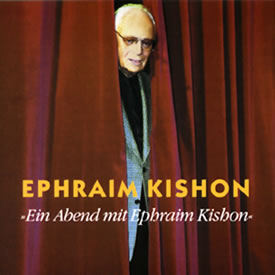
Ephraïm Kishon (23 augustus 1924 29 januari 2005)
De Engelse dichter en schrijver William Ernest Henley werd geboren op 23 augustus 1849 in Gloucester. Zie ook mijn blog van 23 augustus 2007 en ook mijn blog van 23 augustus 2008 en ook mijn blog van 23 augustus 2009.
Anterotics
Laughs the happy April morn
Thro' my grimy, little window,
And a shaft of sunshine pushes
Thro' the shadows in the square.
Dogs are tracing thro' the grass,
Crows are cawing round the chimneys,
In and out among the washing
Goes the West at hide-and-seek.
Loud and cheerful clangs the bell.
Here the nurses troop to breakfast.
Handsome, ugly, all are women . . .
O, the Spring--the Spring--the Spring!
Fill A Glass With Golden Wine
Fill a glass with golden wine,
And the while your lips are wet
Set your perfume unto mine,
And forget.
Every kiss we take and give
Leaves us less of life to live.
Yet again! Your whim and mine
In a happy while have met.
All your sweets to me resign,
Nor regret
That we press with every breath,
Sighed or singing, nearer death.
Waiting
A square, squat room (a cellar on promotion),
Drab to the soul, drab to the very daylight;
Plasters astray in unnatural-looking tinware;
Scissors and lint and apothecary's jars.
Here, on a bench a skeleton would writhe from,
Angry and sore, I wait to be admitted:
Wait till my heart is lead upon my stomach,
While at their ease two dressers do their chores.
One has a probe-it feels to me a crowbar.
A small boy sniffs and shudders after bluestone.
A poor old tramp explains his poor old ulcers.
Life is (I think) a blunder and a shame.
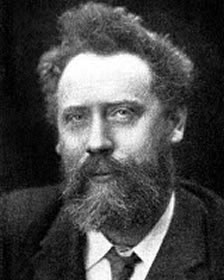
William Henley (23 augustus 1849 11 juli 1903)
De Amerikaanse dichter Edgar Lee Masters werd geboren op 23 augustus 1868 in Garnett, Kansas. Zie ook Zie ook mijn blog van 23 augustus 2007 en ook mijn blog van 23 augustus 2008 en ook mijn blog van 23 augustus 2009.
Zilpha Marsh
At four o'clock in late October
I sat alone in the country school-house
Back from the road 'mid stricken fields,
And an eddy of wind blew leaves on the pane,
And crooned in the flue of the cannon-stove,
With its open door blurring the shadows
With the spectral glow of a dying fire.
In an idle mood I was running the planchette --
All at once my wrist grew limp,
And my hand moved rapidly over the board,
Till the name of "Charles Guiteau" was spelled,
Who threatened to materialize before me.
I rose and fled from the room bare-headed
Into the dusk, afraid of my gift.
And after that the spirits swarmed --
Chaucer, Caesar, Poe and Marlowe,
Cleopatra and Mrs. Surratt --
Wherever I went, with messages, --
Mere trifling twaddle, Spoon River agreed.
You talk nonsense to children, don't you?
And suppose I see what you never saw
And never heard of and have no word for,
I must talk nonsense when you ask me
What it is I see!
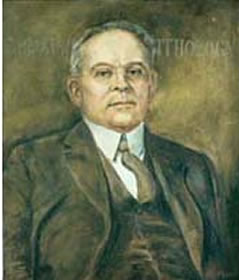
Edgar Lee Masters (23 augustus 1868 5 maart 1950)
De Duitse dichter Theobald Hock werd geboren op 23 augustus 1573 in Limbach/Pfalz-Zweibrücken. Zie ook mijn blog van 23 augustus 2007.
Von Art der Deutschen Poeterey (fragment)
Wir wundern uns dass die Poeten gschriben
So künstlich Vers und Meisterstück getrieben
Dass doch nit ist solch wunder
Weil sie gschrieben b'sunder
Ihr Sprach jetzunder.
Den sein Ouidius und Maro Gierte
Nit gwesen Reimer also hoch geehrte
Die sie in der Mutter Zungen
Lateinisch gsungen
Dass ihnen g'lungen.
Warumb sollen wir den unser Teutsche Sprachen
In gwisse Form und Gsatz nit auch mögen machen
Und Deutsches Carmen schreiben
Die Kunst zutreiben
Bei Mann und Weiben.
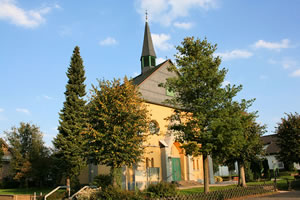
Theobald Hock (23 augustus 1573 - na 1624)
Kerk in Limbach (Geen portret beschikbaar)
De Roemeense essayist, filosoof, kunsthistoricus en politicus Andrei Gabriel Pleşu werd geboren op 23 augustus 1948 in Boekarest. Zie voor onderstaande schrijvers ook mijn blog van 23 augustus 2007.
Uit: Interview with Andrei Pleşu (Door Alexandre Mirlesse in Notre Europe)
Can we speak of a European identity?
I think on the contrary that it is time to pause, to stop speaking about it in the hyperbole currently in favour. Much has been said about Europe already, much has been written; the original nucleus has been enlarged.
Now, whatever happens, there will be a break before the next enlargement, if it takes place. Under these circumstances an exercise in silence might help. Besides, what has been said was not terribly imaginative. Some words appear too often!
So you think, like Hungarian writer Peter Esterhazy, that people should be fined for using expressions like return to Europe, common house, European values?
Oh! I have heard better: A soul for europe! It was the theme of a conference recently organised by some Germans. They like that sort of schmaltz
But, to be quite candid, it isnt just a few similar words but also the same themes that keep popping up
Which ones?
Before we go any further let one thing be clear: these themes are per se utterly honourable. What actually shocks me is the way they are treated. Firstly, of course, we find the famous values. Ah! Values! Culture! Heritage! They never fail to adorn the end of speeches, but you cant help feeling that they are not the heart of the matter rather some kind of flourish, so to speak, the rococo of political discourse. I was recently disturbed by something Angela Merkel said on this subject: Europe is not a Christian club, Europe is a club of values. As though there were some primary contradiction between Christianity and values! If she had said: Europe is not a Christian club, Europe is a ecumenical club or Europe is not a club of madmen, Europe is a club of values that would have been logical. But, as it stands, her sentence suggests a serious lack of understanding of values, Christianity and Europe.
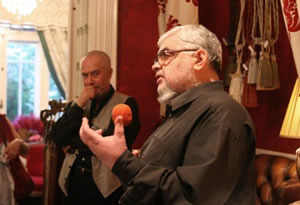
Andrei Pleşu (Boekarest, 23 augustus 1948)
|



